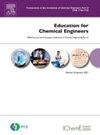Fostering chemical engineering competencies through competition teams: The UPM MotoStudent Electric experience
IF 2.3
2区 教育学
Q1 EDUCATION, SCIENTIFIC DISCIPLINES
引用次数: 0
Abstract
An active learning experience was developed through the UPM MotoStudent competition team, where chemical engineering students tackled challenges related to the cooling of the electric motor. This project led to the development of four chemical engineering-related projects: (i) drying and cooling of air using an adsorption bed and dry ice, (ii) design and construction of a radiator, (iii) development of a testing bench with control systems and information monitoring, and (iv) development and characterization of dielectric oils for the prevention of electroerosion phenomenon. The competition provided a hands-on platform for students to apply their knowledge of heat and mass transfer, fluid mechanics, and process control in a real-world context. Furthermore, soft skills such as leadership, communication, teamwork, and time management were crucially developed, contributing to the overall success of the project. The learning outcomes of this experience pushed students to the highest levels of Bloom's taxonomy—Evaluate and Create—levels seldom reached in undergraduate courses. Participants highlighted the project's strong impact on technical learning, personal growth and teamwork.
通过竞争团队培养化学工程能力:芬欧汇川摩托学生电气经验
UPM MotoStudent竞赛团队开发了一种积极的学习体验,化学工程专业的学生解决了与电机冷却相关的挑战。该项目导致了四个化学工程相关项目的发展:(i)使用吸附床和干冰干燥和冷却空气,(ii)散热器的设计和建造,(iii)开发带有控制系统和信息监测的试验台,以及(iv)开发和表征用于防止电侵蚀现象的介电油。比赛为学生提供了一个动手的平台,让他们在现实世界中应用他们在传热传质、流体力学和过程控制方面的知识。此外,软技能,如领导、沟通、团队合作和时间管理都得到了至关重要的发展,有助于项目的整体成功。这段经历的学习成果将学生们推向了布鲁姆分类法的最高层次——评估和创造——在本科课程中很少达到的水平。参与者强调了该项目对技术学习、个人成长和团队合作的巨大影响。
本文章由计算机程序翻译,如有差异,请以英文原文为准。
求助全文
约1分钟内获得全文
求助全文
来源期刊

Education for Chemical Engineers
Multiple-
CiteScore
8.80
自引率
17.90%
发文量
30
审稿时长
31 days
期刊介绍:
Education for Chemical Engineers was launched in 2006 with a remit to publisheducation research papers, resource reviews and teaching and learning notes. ECE is targeted at chemical engineering academics and educators, discussing the ongoingchanges and development in chemical engineering education. This international title publishes papers from around the world, creating a global network of chemical engineering academics. Papers demonstrating how educational research results can be applied to chemical engineering education are particularly welcome, as are the accounts of research work that brings new perspectives to established principles, highlighting unsolved problems or indicating direction for future research relevant to chemical engineering education. Core topic areas: -Assessment- Accreditation- Curriculum development and transformation- Design- Diversity- Distance education-- E-learning Entrepreneurship programs- Industry-academic linkages- Benchmarking- Lifelong learning- Multidisciplinary programs- Outreach from kindergarten to high school programs- Student recruitment and retention and transition programs- New technology- Problem-based learning- Social responsibility and professionalism- Teamwork- Web-based learning
 求助内容:
求助内容: 应助结果提醒方式:
应助结果提醒方式:


